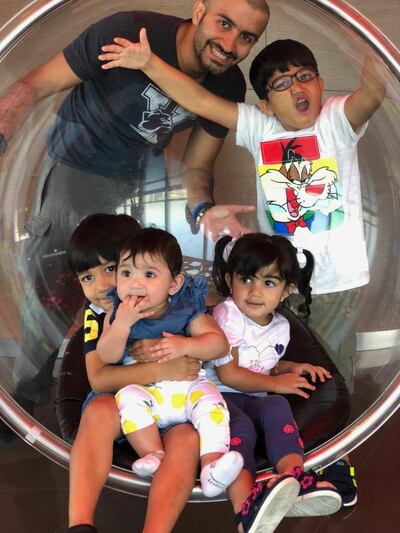Worshippers across the UAE have spoken out about the challenges they face following the closure of mosques and churches in the country.
Authorities took the decision to call on the public to stay at home to pray as part of efforts to contain the spread of coronavirus.
Since the move, many residents have told how communities have adapted to make the best of the temporary disruption.
Some even suggested families had been brought closer together because they now prayed side by side at home.
“It is a golden opportunity for me to connect with my children,” said Emirati Abdullah Al Qassab, 34, a stand-up comedian and research engineer.
“It’s a chance to let them see me pray from home - it will show the importance of prayer to them.
“Being in isolation can feel like an anger management boot camp at times but there are positives.
“Quite often fathers are away at work so I am grateful to spend more time with the family.”
On March 16, the UAE announced that all places of worship would close for at least four weeks.
Since then, communities around the country have been forced to adapt, stepping outside their usual prayer routine.
Mohammedullah Moin, Imam of Ali Salem al Kaabi mosque in Abu Dhabi, said the closure of mosques had left him feeling nostalgic towards his own.
He said prior to the recent stay at home prevention measure, he had walked around it once a day.
“I [did] see people trying to pray outside the mosque,” he said.
“Alhamdulilah (thank God) the people here are abiding by the law. Whatever message they get from the government they follow it.
“I pray at home with my wife and children. I have two sons, 17 and 16, and my daughter is 12.
“Obviously I miss going to the mosque everyday. The first day I cried when it was locked.
“And during Isha prayers the night before, when I prayed I cried and the worshippers also cried.”
The UAE government estimates there are close to 5,000 mosques across the country. There are also nine Catholic churches and a "landmark" Hindu temple is currently under construction in Abu Dhabi.
Leaders of Dubai’s Catholic community have also been forced to adapt due to the coronavirus outbreak.
Father Reinhold Sahner, Parish Priest at St Francis of Assisi Catholic Church in Dubai’s Jebel Ali, said his Mass was now recorded so it could be watched online from home whenever worshippers had the opportunity.

“We are saying Mass every day in the parish [behind closed doors] and encouraging people to stay connected with God and watch Mass where they can,” he said.
“We recorded Sunday Mass and put it online and shared it via WhatsApp so [people] can watch it whenever it suits them.
“We are asking people to stay in touch with us by email, WhatsApp and phone so they can make appointments [for confession].
“We can perform confession through the [church] gates or take them into an isolated room where it can be heard.
“We’ve also spoken to people who are worried about family members who might be particularly vulnerable.
“We take the details of the person they are concerned about and then say Mass for them and include them in our prayers.”
Fiona Cottam, a school principal in Dubai, said being able to watch her local mass back home in Ireland had helped her feel less isolated from her family.
“I can go to the local church webcam and it makes me feel connected with my mother who I know is watching too from the safety of her home in Ireland,” she said.
Pastor John Folmar, from the United Christian Church of Dubai, urged his congregation to do the same.
He has provided online Bible study groups for the 500 people who regularly attend his services.
“Watching through the likes of Zoom is no substitute for attending church,” he said.
“But we are experiencing something unprecedented and can only equip ourselves the best we can.”

